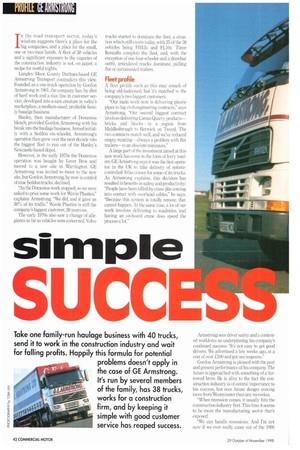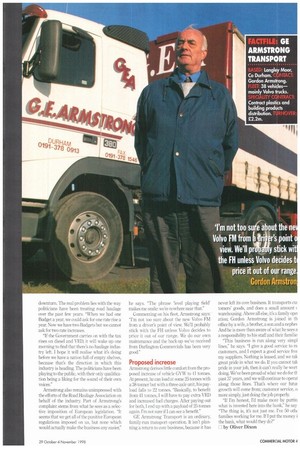simple
Page 44

Page 45

If you've noticed an error in this article please click here to report it so we can fix it.
SUCC
Take one family-run haulage business with 40 trucks, send it to work in the construction industry and wait for falling profits. Happily this formula for potential problems doesn't apply in the case of GE Armstrong. It's run by several members of the family, has 38 trucks, works for a construction firm, and by keeping it simple with good customer service has reaped success.
In the road transport sector, today's wisdom suggests there's a place for the big companies, and a place for the small, one or two-man bands. A fleet of 38 vehicles and a significant exposure to the vagaries of the construction industry is not, on paper, a recipe for restful nights.
Langley Moor, County Durham-based GE Armstrong Transport contradicts this view. Founded as a one-truck operation by Gordon Armstrong in 1961, the company has, by dint of hard work and a nice line in customer service, developed into a rare creature in today's marketplace, a medium-sized, profitable family haualge business.
Hanley, then manufacturer of Domestos bleach, provided Gordon Armstrong with his break into the haulage business. Armed initially with a Seddon six-wheeler, Armstrong's operation then grew over the next decade into the biggest fleet to run out of the Hanley's Newcastle-based depot.
However, in the early 1970s the Domestos operation was bought by Lever Bros and moved to a new site in Warrington. GE Armstrong was invited to move to the new site, but Gordon Armstrong, by now in control of nine Seddon trucks, declined.
"As the Domestos work stopped, so we were asked to price some work for Wavin Plastics," explains Armstrong. "We did, and it gave us 50% of its traffic." Wallin Plastics is still the company's biggest customer, 26 years on.
The early 1970s also saw a change of allegiance as far as vehicles were concerned. Volvo trucks started to dominate the fleet, a situation which still exists today, with 35 of the 38 vehicles being 11112s and FL10s. Three Renaults complete the fleet, and, with the exception of one four-wheeler and a drawbar outfit, articulated trucks dominate, pulling flat or curtainsided trailers.
Fleet profile
A fleet profile such as this may smack of being old-fashioned; but it's matched to the company's two biggest customers.
"Our main work now is delivering plastic pipes to big civil engineering contracts," says Armstrong. "Our second biggest contract involves delivering Camas Quarry products— bricks and blocks -in a region from Middlesbrough to Berwick on Tweed. The two contracts match well, and we've reduced empty runningalways a problem with flat trailers—to an absolute minimum."
A large part of the investment aimed at this new work has conic in the form of lorry loaders. GE Armstrong says it was the first operator in the UK to take delivery of remotecontrolled Atlas cranes for some of its trucks. As Armstrong explains, this decision has resulted in benefits in safety and productivity: "People have been killed by crane jibs coming into contact with overhead cables," he says. "Because this system is totally remote, that cannot happen. At the same time, a lot of our work involves delivering to roadsides. and having an on-board crane does speed the process a lot: Armstrong sees driver safety and a contented workforce as underpinning his company's continued success: "It's not easy to get good drivers. We advertised a few weeks ago, at a cost of over ,C100 and got one response."
Gordon Armstrong is pleased with the past and present performance of his company. The future is approached with something of a furrowed brow. He is alive to the fact the construction industry is of central importance to his success, but sees future danger coming more from Westminster than any recession.
"When recession comes, it usually hits the construction industry first. This time it seems to be more the manufacturing sector that's exposed.
"We can handle recessions. And I'm not sure if we ever really came out of the 1990 downturn. The real problem lies with the way politicians have been treating road haulage over the past few years. "When we had one Budget a year, we could ask for one rate rise a year. Now we have two Budgets but we cannot ask for two rate increases.
"If the Government carries on with the tax rises on diesel and VEY), it will wake up one morning to find that there's no haulage industry left. I hope it will realise what it's doing before we have a nation full of empty shelves. because that's the direction in which this industry is heading. The politicians have been playing to the public, with their only qualification being a liking for the sound of their own voices."
Armstrong also remains unimpressed with the efforts of the Road Haulage Association on behalf of the industry. Part of Armstrong's complaint stems from what he sees as a selective imposition of European legislation. "It seems that we get all of the punitive European regulations imposed on us, but none which would actually make the business any easier.,"
he says. "The phrase 'level playing field' makes me smile: we're nowhere near that."
Commenting on his fleet. Armstrong says: "I'm not too sure about the new Volvo FM from a driver's point of view. We'll probably stick with the I'll unless Volvo decides to price it out of our range. We do our own maintenance and the back-up we've received from Darlington Commercials has been very good."
Proposed increase
Armstrong derives little comfort from the proposed increase of vehicle GVW to 41 tonnes. At present, he can load at some 25 tonnes with a 38-tonner but with a three-axle unit, his payload falls to 22 tonnes. "Basically, to benefit from 41 tonnes, I will have to pay extra VED and increased fuel charges. After paying out for both, I end up with a payload of 25 tonnes again. I'm not sure if I can see a benefit."
GE Armstrong Transport is an ordinary, family-run transport operation. It isn't planning a return to core business, bemuse it has
never left its core business. It transports cut tomers goods, and does a small amount {warehousing Above all else, it's a family opel ation; Gordon Armstrong is joined in th office by a wife, a brother, a son and a nephel., And he is more than aware of what he sees a a responsibility to his staff and their fam die!
"This business is run along very simpl lines," he says. "I give a good service to m customers, and I expect a good service fmr my suppliers, Nothing is leased, and we tak great pride in what we do. If you cannot tak pride in your job, then it can't really be wort doing. We've been proud of what we do for th past 37 years, and we will continue to operai along those lines. That's where our futut growth will come from; customer service, o more simply, just doing the job properly.
"If I'm honest, I'd make more by puttin what is invested here into the bank," he say "The thing is, its not just me. I've 50 otht families working for me. If I put the money i the bank, what would they do?"
I by Oliver Dixon
GE ARMSTRONG TRANSPORT
Langley Moor, Co Durham.
Gordon Armstrong. 38 vehicles— mainly Volvo trucks.
Contract plastics and building products distribution.
£2.2m.
















































































































